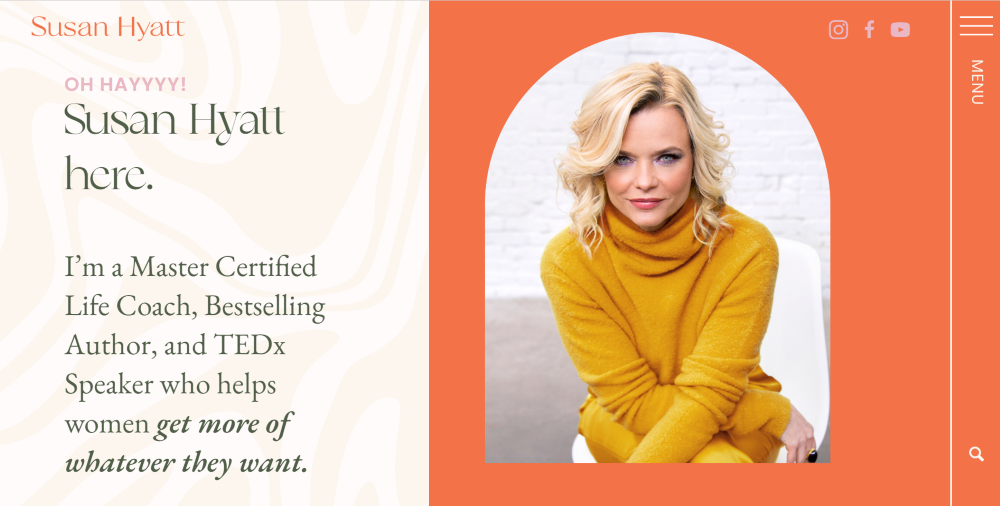Different Types of Life Coaches: Identify Your Coaching Niche

Welcome to the dynamic and diverse world of life coaching! With many specialties under the umbrella term of "life coaches," the possibilities are as varied as the individuals you aim to help.
In this comprehensive guide, we delve deep into the world of different types of life coaches.
Are you a natural at steering people towards their career goals, or do you find your passion lies in nurturing personal growth? Perhaps guiding individuals towards healthier lifestyles is where your heart is. No matter your inclination, there's a niche in life coaching tailored just for you.
But why is it so important to pinpoint your specific niche?
Simply put, in the realm of life coaching, specialization isn't just a buzzword – it's the key to connecting with the right clients and making a lasting impact.
So, buckle up as we explore the different types of life coaches and help you answer the all-important question: "Which specialty is truly yours?"
Here’s what we’ll cover in this guide:
What is a Life Coach?
Get to know the fundamental role of a life coach and how this profession has evolved to impact lives and communities.What Do Life Coaches Do?
Dive into the core responsibilities, diverse techniques, and success metrics that define the day-to-day of life coaches.The Various Specializations in Life Coaching
Explore the wide array of coaching niches, from career to spiritual coaching, and see where your passion fits in.Finding Your Niche as a Life Coach
Learn how to identify your unique coaching specialty with insights and real-life coach examples to guide you.Qualifications and Training for Different Types of Life Coaches
Understand the essential qualifications and continuous learning paths that pave the way for a successful coaching career.How Do Life Coaches Find Clients?
Discover effective strategies for marketing your services, networking, and utilizing digital platforms to build your client base.Challenges and Rewards in Various Coaching Specialties
Uncover the unique challenges and gratifying rewards that come with different types of life coaching specialties.
What is a Life Coach?
So, let's start with the basics. What exactly is a life coach?
At its core, life coaching is about empowerment. It's a profession that revolves around helping individuals realize their full potential, overcome obstacles, and make significant changes in their lives.
Think of a life coach as a catalyst for transformation – someone who guides, motivates, and supports clients on their journey to personal and professional fulfillment.
Evolution of the Profession
Life coaching hasn't always been as recognized as it is today.
It's a profession that has evolved dramatically over the years. From its early days, when the focus was primarily on career and business, life coaching has encompassed nearly every aspect of personal and professional development.
Today, it's a multifaceted field with coaches specializing in everything from health and wellness to relationships and spirituality.
Impact on Individuals and Communities
The beauty of life coaching lies in its ripple effect.
The impact of a life coach extends far beyond individual sessions. When people achieve their goals, overcome challenges, and grow as individuals, it doesn't just transform their lives; it also positively affects the communities around them.
Coaches help build stronger, more resilient individuals, and this, in turn, creates stronger communities. Whether it's helping someone find their dream job, improve their health, or navigate life's complexities, the influence of a life coach can be profound and far-reaching.
In essence, life coaching goes beyond mere goal-setting and problem-solving. It's a partnership that nurtures growth, instills confidence, and drives meaningful change – not just for individuals but for entire communities.
And for you, as a coach, understanding and embracing this impact can be one of the most rewarding aspects of your career.
What Do Life Coaches Do?
Now that we've explored the different types of life coaches let's dig into what they actually do. Despite the variety in specializations, some core responsibilities remain consistent across the board.
Core Responsibilities:
Setting and Achieving Goals: Life coaches work with clients to identify and set realistic, achievable goals.
Providing Support and Accountability: They offer ongoing support and keep clients accountable for their progress.
Offering Insight and Perspective: Coaches often provide new perspectives and insights, helping clients see challenges and opportunities in a new light.
Techniques and Methodologies:
Tailored Approach: The techniques used can vary widely depending on the coach's specialization. For instance, a career coach might use personality assessments, while a health coach could incorporate nutritional plans.
Holistic Methods: Many coaches adopt a holistic approach, considering all aspects of a client's life.
Continuous Learning: Coaches often stay updated with the latest methodologies and tools in their field, ensuring they provide the best guidance possible.
Success Metrics and Outcomes:
Personalized Success Metrics: Success in life coaching isn't one-size-fits-all. For a health coach, success might mean improved physical health metrics for a client, while for a business coach, it could be about increased revenue or team productivity.
Outcomes Beyond Numbers: Outcomes also include intangible aspects like improved self-esteem, better work-life balance, or enhanced personal relationships.
Long-Term Impact: The ultimate goal of most types of life coaching is to bring about sustainable, long-term change in clients' lives.
So, as a life coach, no matter your specialty, your role revolves around guiding, supporting, and empowering people to make positive changes.
It's about more than just achieving goals; it's about facilitating personal growth and development. This is what makes life coaching such an impactful and rewarding profession.
The Various Specializations in Life Coaching
Alright, let's get to the heart of the matter. The field of life coaching is as diverse as it is dynamic. Here's a closer look at the different types of life coaches and the unique roles they play:
1. Career Coaching:
Focus: Assisting clients in navigating their career paths, from finding the right job to advancing in their current roles.
Impact: Career coaches help individuals align their professional life with their personal goals and values.
2. Health and Wellness Coaching:
Focus: Emphasizing overall well-being, including physical health, nutrition, and lifestyle changes.
Impact: These coaches play a pivotal role in guiding individuals towards healthier, more balanced lives.
3. Relationship Coaching:
Focus: Aiding clients in building and maintaining healthy personal and professional relationships.
Impact: Relationship coaches help people develop better communication skills, empathy, and understanding in various types of relationships.
4. Financial Coaching:
Focus: Helping clients achieve financial stability and literacy.
Impact: Financial coaches are instrumental in guiding people to make informed decisions about money management and investment.
5. Spiritual Coaching:
Focus: Assisting individuals in exploring and deepening their spiritual beliefs and practices.
Impact: These coaches often help clients find greater purpose and fulfillment in life.
6. Personal Development Coaching:
Focus: Focused on self-improvement and personal growth in various aspects of life.
Impact: Personal development coaches empower clients to realize their full potential and overcome personal challenges.
7. Executive/Business Coaching:
Focus: Aimed at professionals looking to enhance leadership skills, organizational development, and business strategy.
Impact: These coaches are key in shaping effective leaders and successful business strategies.
But wait, there's more! The life coaching industry is always evolving, with new niches emerging as society changes.
For example, digital wellness coaches are becoming more prevalent as we grapple with the impacts of technology on our lives. Sustainability coaches are helping individuals and businesses become more environmentally conscious.
The list goes on, and it's a thrilling time to be part of this ever-growing field.
Each type of life coach brings something unique to the table, and it's fascinating to see how diverse the world of life coaching has become. As a coach, finding your place in this broad spectrum can be both exciting and daunting.
But remember, your specialty isn't just about what you're good at – it's about where your passion lies and how you can make the most significant impact.
Finding Your Niche as a Life Coach
Navigating the vast world of life coaching can feel like a journey through uncharted territory. The key to not just surviving but thriving in this journey.
Let's unpack why pinpointing your specialty is a game-changer and how you can identify yours.
The Importance of a Specialty
Standing Out: In a sea of coaches, a specialty helps you stand out. It's your unique selling proposition – what makes you different.
Effective Marketing: When you have a clear niche, your marketing becomes more targeted and effective. You're speaking directly to those who need your specific expertise.
Deeper Impact: Specializing allows you to dive deep into a particular area, enhancing your ability to make a meaningful impact in your clients' lives.
Self-Assessment Questions
To help narrow down your niche, ask yourself these questions:
What am I passionate about? Your niche should align with what you love and feel strongly about.
What are my strengths? Consider the areas where you naturally excel.
What experiences have shaped me? Often, your personal journey can guide you to your coaching niche.
Who do I enjoy working with? Think about the type of clients who energize and inspire you.
What unique perspective do I bring? Your unique experiences and insights can set you apart.
Coaches Who Niched Down
These coaches have carved out distinct niches for themselves, demonstrating the diverse opportunities within the field of life coaching and the profound impact a coach can have when they align their expertise with their passion. Let’s take a look:
Martha Beck – Life and Career Coaching:

Background: Martha Beck is a life coach and author known for her monthly column in “O, The Oprah Magazine.”
Specialty: Beck's niche is in life and career coaching, where she combines her academic background in sociology with practical life coaching techniques.
Impact: She's recognized for her insightful and empathetic approach to helping people achieve personal and professional fulfillment.
Gail Gazelle – Physician Coaching:

Background: Dr. Gail Gazelle is a former hospice physician and now a part-time assistant professor at Harvard Medical School.
Specialty: She specializes in coaching physicians, focusing on burnout prevention and resilience building.
Impact: Her coaching and workshops have been instrumental in helping doctors manage stress, avoid burnout, and find more fulfillment in their medical careers.
Susan Hyatt – Life and Business Coaching:

Background: Susan Hyatt is a master-certified life and business coach who started her career in residential real estate.
Specialty: Hyatt focuses on empowering women in business and life, helping them achieve their goals and improve their personal and professional lives.
Impact: Through her coaching programs, books, and popular podcast, she has inspired many women to pursue their ambitions and live life on their own terms.
Qualifications and Training for Different Types of Life Coaches
Embarking on a career in life coaching isn't just about having a passion for helping others; it's also about equipping yourself with the right qualifications and continually honing your skills. Let's dive into what it takes to become a well-qualified life coach, no matter your chosen niche.
Qualifications and Certifications:
Foundation: A basic requirement for most life coaches is a certification from a recognized coaching institution, like the International Coach Federation (ICF), the International Association of Coaching (IAC), or the Center for Credentialing & Education (CCE).
Specialized Certifications: Depending on your niche, you might pursue additional certifications. For instance, a health and wellness coach might get certified through the National Board for Health & Wellness Coaching (NBHWC).
Educational Background: While a specific degree isn't always necessary, having educational background in psychology, counseling, or a related field can be beneficial.
Training and Continuous Education:
Initial Training Programs: These programs often include coursework on coaching techniques, ethics, and practice management. They can range from a few months to a year.
Specialized Training: To specialize, coaches often pursue additional training in their chosen area, such as financial planning courses for financial coaches or nutrition for health coaches.
Continual Learning: The best coaches stay abreast of the latest developments in their field, which can include attending workshops, seminars, and conferences, as well as engaging in regular self-study.
Ethical Considerations and Professional Standards:
Adhering to Ethics: Ethics are paramount in coaching. This includes maintaining confidentiality, avoiding conflicts of interest, and providing honest, transparent services.
Professional Standards: Following established standards, such as those set by ICF, ensures that coaches maintain a high level of professionalism and efficacy in their practice.
Cultural Competency: In our diverse world, understanding and respecting cultural differences is crucial. Many coaching programs now include training on cultural competency.
As a life coach, your journey of learning and development is continuous. Whether you're a career coach guiding professionals towards their dream job, a health coach advocating for better lifestyle choices, or any other type of coach, staying updated and ethically grounded is key to your success and the success of your clients.
How Do Life Coaches Find Clients?
Once you've honed your skills and identified your niche, the next big step is building your client base. In today's digital age, life coaches have a plethora of tools and strategies at their disposal for attracting clients.
Let's explore how different types of life coaches can effectively market their services and network to grow their practice.
Marketing Strategies
Content Marketing: Share your expertise through blogs, eBooks, email newsletters, or webinars. This not only showcases your knowledge but also helps potential clients understand what you offer. For instance, a health and wellness coach might blog about nutrition tips, or a business coach could offer a free webinar on leadership skills.
Niche-Specific Marketing: Tailor your marketing efforts to your niche. A relationship coach, for example, might contribute articles to relationship-focused magazines or websites.
Public Speaking, Workshops, and Podcasts: Hosting or speaking at events or featuring as a guest on a podcast (or starting your own) can position you as an authority in your field and attract clients who are interested in your specific expertise.
Networking and Building a Client Base
Referral Networks: Build networks with other professionals who can refer clients to you. A career coach might network with recruitment agencies, while a spiritual coach could connect with local community groups.
Collaborations: Collaborate with businesses or organizations in your niche. For example, a financial coach could partner with financial planning firms.
Utilizing Online Platforms and Social Media
Social Media Presence: Platforms like LinkedIn, Instagram, or Facebook are powerful tools for reaching potential clients. Share insightful posts, client testimonials, and engaging content relevant to your niche.
Online Coaching Platforms: Listing your services on coaching platforms can increase your visibility to individuals actively seeking coaching services.
Personal Website: A well-designed website with clear information about your services, testimonials, and a way to book sessions or contact you is crucial.
For life coaches, finding clients is about much more than just advertising; it's about building relationships, establishing trust, and demonstrating the value you can bring to someone's life. Whether through online channels or in-person networking, the key is to be authentic and genuinely focused on helping people achieve their goals.
Challenges and Rewards in Various Coaching Specialties
The path of a life coach, regardless of the specialty, is dotted with challenges and rewards that make the journey unique and fulfilling. Here’s a look at some common hurdles and triumphs across different coaching niches.
Common Challenges
Building Trust:
One of the primary challenges, especially for new coaches, is establishing trust with clients. This can be particularly true for areas like relationship or financial coaching, where clients need to discuss personal and sensitive issues.
Market Saturation:
In popular niches like personal development or health and wellness, the market can be quite saturated, making it a challenge to stand out.
Keeping Up with Trends:
Fields like executive coaching or digital wellness require coaches to stay abreast of the latest industry trends and technologies, which can be both time-consuming and challenging.
Unique Rewards and Satisfaction:
Transforming Lives:
The most significant reward across all types of coaching is witnessing the positive transformation in clients' lives. Whether it’s a career coach helping someone land their dream job or a health coach seeing a client achieve their health goals, the impact is deeply satisfying.
Personal Growth:
Coaches often report immense personal growth as they guide others. This is particularly true in niches like spiritual or personal development coaching, where the coach's journey mirrors that of their clients.
Flexibility and Autonomy:
Many coaches, especially in areas like business or executive coaching, appreciate the flexibility and autonomy their career provides. Being able to set their schedules and choose their clients allows for a fulfilling work-life balance.
Looking for even more flexibility in your coaching practice? Discover the ease of life coaching with Clarityflow.
Each type of coaching comes with its own set of challenges and rewards, shaping a career that’s as diverse as it is rewarding.
Conclusion: Embracing Your Niche in Life Coaching with Clarityflow
In wrapping up our deep dive into the dynamic world of life coaching, we've uncovered the richness and variety that this profession holds. Life coaching is not just a career; it's a calling that spans various specialties, from career and health to spiritual and executive coaching.
Each niche presents unique challenges but also brings immense rewards, both for the coach and the clients they serve.
The essence of life coaching lies in the continuous journey of learning, growing, and adapting, which is vital for both personal development and professional success.
As you embark on or continue your journey as a life coach, remember to explore and find your unique place within this expansive and evolving industry.
And if you're looking for a tool to help manage your practice efficiently, consider Clarityflow. It's designed to streamline your coaching process, making it an excellent companion on your professional journey.


